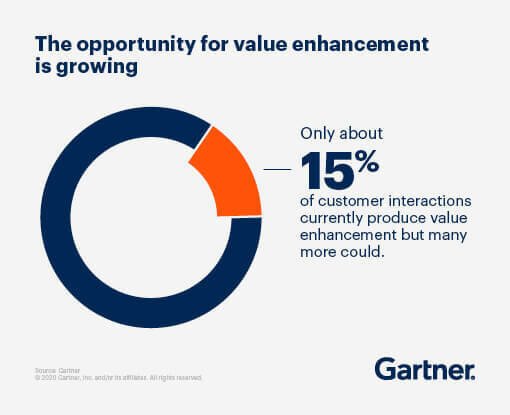blog
The Impact of Customer-Facing Apps on Customer Retention
By Mohan S Apps Business April 7, 2023

Over the past decade, customer-facing apps have become a game-changer for businesses. Customers do not hesitate to switch services in case businesses do not add value to them, and business owners know that it costs much more to acquire new customers than to retain old customers.

(Source: Gartner)
Customers today have access to endless options at their fingertips. When their needs aren’t met, they won’t hesitate to switch brands. In fact, research shows that 66% of consumers are willing to pay more for a great customer experience (source).
3 Things Apps Do That Enhance Customer Retention
Apps can provide a personalized and convenient experience for customers, allowing them to easily access information, products, and services from a business. Moreover, apps can help businesses collect and analyze customer data, enabling them to tailor their offerings and improve the customer experience.
Improved customer engagement
Online retail experience was on the rise already when Covid-19 boosted the online shopping growth. Shopping has become digitized. Brands all around are looking for ways to set themselves apart from their competitors. Gartner shares how mobile apps are the most effective way a business can establish themselves amongst competition.
Further reading: Explore 7 essential metrics for customer success
Some of the ways mobile apps are improving customer engagement are:
1. More Personalized
Apps can offer a personalized experience for customers by allowing them to set preferences and receive targeted recommendations based on their behavior and past interactions with the app. Mobile apps can bring personalization and convenience to their users through browsing and purchase history, demographics, and other data points.
2. More predictive suggestions
Mobile apps can improve customer engagement through predictive suggestions by using data analytics and machine learning algorithms to recommend products or services to customers that are tailored to their needs and preferences.
For example, an app could suggest products based on past purchases, notify users of special promotions, or highlight content relevant to their interests. This not only enhances the customer experience but also increases the likelihood of repeat business.
Case study: At Buuuk, we worked with Scoot Airlines to build the Cabin Assist App, which improved operational efficiency and enhanced customer experiences. The personalized notifications and proactive customer updates through the app have driven higher engagement, translating into more repeat business for the airline. By enabling real-time access to important information and integrating personalized features, the app helped Scoot save over 2,625 man-hours per month and significantly boosted customer satisfaction. Read more.
More proactive approach
1. Strengthening Brand Identity
Apps provide a platform for businesses to showcase their brand identity. By incorporating a cohesive design, logo, color scheme, and tone that align with the brand, apps reinforce brand recognition. This familiarity fosters trust, which is key to building lasting customer relationships.
2. Building Loyalty with Rewards Programs
Loyalty programs integrated into mobile apps can drive repeat purchases by offering incentives such as points, discounts, or exclusive rewards. These programs encourage customers to engage more frequently, helping to increase brand loyalty and customer retention.
3. Anticipate and provide with smart notifications
Mobile apps can help businesses to anticipate the needs and preferences of their customers, and provide proactive recommendations and solutions.They can send notifications to customers to keep them updated on new products, promotions, or other updates from the business.
These notifications can be triggered based on customer behavior or preferences, and can help to keep customers engaged and informed.
Apps can use geolocation technology to provide proactive recommendations to customers based on their location. For example, a retail app can suggest nearby stores or products based on the customer's location.
You may also like: 3 components of customer loyalty.
Case study: Buuuk partnered with Daimler to create a mobile app for Mercedes-Benz dealerships in Southeast Asia. The app was designed to streamline sales processes, inventory management, and customer relationship management, while also providing a direct line of communication through push notifications. These notifications kept customers informed about special promotions, test drives, and new vehicle launches. As a result, the dealerships saw improved customer retention and a reduction in operational bottlenecks. Read more.
More efficient marketing
Marketing through mobile apps can be an effective strategy for businesses looking to reach and engage with customers. Customer-facing apps can enhance more efficient marketing for businesses in several ways. Here are some ways in which customer-facing apps can help businesses to improve their marketing efforts:
1. Understanding customer journey and behavior
Mobile apps can understand customer journey and behavior by collecting and analyzing data on user interactions within the app. Mobile apps have the option for users to set preferences at the start, based on this information apps can customize their service to each customer.
2. Another way for your customers to contact you
Mobile apps can also use in-app messaging to communicate with customers in real-time. This can help businesses to provide personalized recommendations and support, which can improve customer satisfaction and loyalty.
3. Increased sales
Mobile apps can feature in-app promotions and discounts to encourage customers to make a purchase. This can help to increase the likelihood of a sale and encourage repeat purchases. Mobile apps can also allow customers to share their purchases on social media, which can help to increase brand awareness and drive sales. Loyalty programs are another way that can reward customers for making purchases and engaging with the app.
Case study: Buuuk developed an app that helped retail chain CapitaLand Malls bring their customer loyalty program into the 21st century. By digitally transforming the process and providing customers with an easy-to-use app, shoppers have even more reasons to visit their 20 malls throughout Singapore. Read more.
Conclusion
In recent years, consumers downloaded 255 billion mobile apps to their devices, more than 80 percent from 140.7 billion app downloads in 2016. - Statista
Mobile apps can be a powerful tool for businesses to enhance customer engagement, build brand awareness, and create more efficient marketing campaigns. By leveraging data analytics, machine learning, and other advanced technologies, businesses can create mobile apps that meet the evolving needs and expectations of their customers, while also standing out in a crowded market. In conclusion, businesses that are able to adapt to rising consumer expectations and increasing competition will be better positioned to succeed in the long term.


